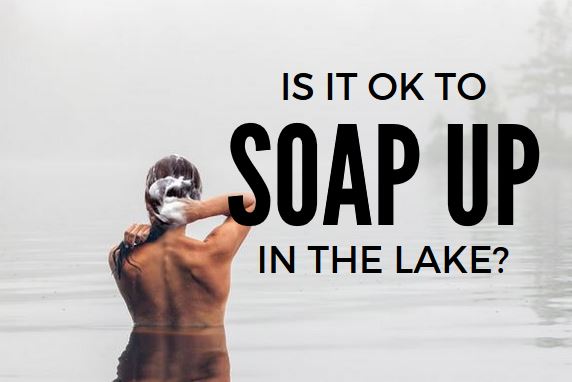
Q. I live on a small lake. I have a dock, and a kayak, and a pedal boat for my niece, and hands that get dirty. I’d like to have the safest possible soap to use on the dock to wash hands and boats and furniture, and so on. Based on my own research, it seems to me that Seventh Generation dish soap may actually meet my needs without harming the lake or the critters therein? Do you concur? ~Dennis K., Sumter, S.C.
A. Lots of people mistakenly think that biodegradable soaps are OK to use in the water — but I’ll need to ask you to put down that bottle and back away from your dock!
“Biodegradable” and “nontoxic” sure sound appealing on a soap label, don’t they? Terms like this may lead us to believe that the contents will break down immediately and harmlessly, causing no damage to the complex ecosystem of plants, fish, bugs, and other tiny aquatic creatures at your lakefront home. Unfortunately, this is not true.
“Biodegradable” means that the soap will break down in the environment, but it glosses over how long that will take, and what sort of effects the process might have in the meantime. And those effects can be quite detrimental: Phosphorus, a common ingredient in soaps, is like steroids to aquatic plants and algae, leading to overgrown algal blooms and a sharp drop in the oxygen so vital to lake fauna. Soaps can also break the surface tension of water, further lowering oxygen levels. Surfectants in soap can be toxic to lake life, especially tiny invertebrates.
According to the EPA, an ounce of biodegradable soap needs to be diluted in 20,000 ounces of water to be safe for fish. Now imagine all of your neighbors scrubbing down on their docks, and you can see how the health of your small lake could be significantly compromised.
I hate to throw cold water all over the lakeside tradition of soaping up on the dock, Dennis, but you’d do well to keep your cleanup on dry land. Most environmental service agencies and kayak manufacturers I surveyed say plain old water and elbow grease should be enough to clean your boats. This task will be easiest if you rinse your vessels with freshwater frequently to prevent any buildup.
As for your hands, can you wash up in the house? If not, you can set up a simple hand-washing station by the dock. Fancier versions consist of a bucket with some kind of pump and faucet, but a single container for soapy wastewater will do — anything that keeps the soap out of the lake and can be dumped down your sink later.
Now, if the freshwater rinse on that boat just isn’t up to your standards of cleanliness, an occasional scrub-down with biodegradable soap is OK. The best-case scenario here is for you to take the boats to a dedicated washing facility that channels wastewater to a treatment plant, not your lake (available at some marinas). Failing that, pull your boat at least 200 feet from shore and use the sponge-and-bucket technique to clean it: Fill a bucket with water and a little bit of soap, saturate the sponge, scrub, and gather the rinse water as best you can. The same approach ought to work for any furniture that needs cleaning (you’re talking about lawn chairs, not your living-room sofa, right?).
Biodegradable soap is acceptable on the lawn, by the way, because soil helps filter troublesome pollutants, keep them out of waterways, and eventually break them down. One popular brand spells this out right on the bottle. But in the lake? A Quebec environmental group said it well: “If you wouldn’t drink it, keep it out of our lakes and rivers.” And maybe not even if you would, I venture. Have you seen what goes into a soda these days?
Oxygenatedly, Umbra
Posted by Scott Freerksen “The Lake Guy”
